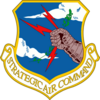
The 72nd Air Base Wing is a United States Air Force unit assigned to the Air Force Sustainment Center at Tinker Air Force Base, Oklahoma. It has been the host unit at Tinker since activating there on 1 October 1994.

The 39th Air Base Wing is a United States Air Force unit assigned to the Third Air Force. It is stationed at Incirlik Air Base, Turkey. The wing is also the host unit at Incirlik.

Ramey Air Force Base also known as Borinquen Field, is a former United States Air Force base in Aguadilla, Puerto Rico. It was named after United States Army Air Forces Brigadier General Howard Knox Ramey. Following its closure, it was redeveloped into Rafael Hernandez Airport.

The 23rd Bomb Squadron is a United States Air Force unit, assigned to the 5th Bomb Wing. It is stationed at Minot Air Force Base, North Dakota. The mission of the squadron is to fly the Boeing B-52H Stratofortress strategic bomber. The men and women of the "Bomber Barons" stand ready to project global power on a daily basis in both conventional and nuclear warfare.

The 19th Air Division is an inactive United States Air Force formation. Its last assignment was with Eighth Air Force at Carswell Air Force Base, Texas, where it was inactivated on 30 September 1988.

The 449th Air Expeditionary Group is a provisional United States Air Force unit assigned to the Third Air Force supporting United States Africa Command. It is stationed at Camp Lemonnier, Djibouti. It flies missions for Africa Command and Combined Joint Task Force – Horn of Africa, supporting varied U.S. objectives in the area.

The 70th Air Refueling Squadron is an Air Force Reserve Command unit, assigned to the 349th Operations Group at Travis Air Force Base, California. It is an associate of the active duty 9th Air Refueling Squadron, United States Air Force, and operates the McDonnell Douglas KC-10 Extender aircraft conducting mobility, and air refueling missions. The squadron has served in this role since 1994.

The 72d Test and Evaluation Squadron is part of the 53d Wing at Eglin Air Force Base, Florida. The squadron is geographically separated but is operated from Whiteman Air Force Base, Missouri. It conducts testing and evaluation of the B-2 Spirit aircraft.

The 65th Special Operations Squadron is an Air Force Special Operations Command unit which flies the General Atomics MQ-9 Reaper at Hurlburt Field, Florida. The squadron was first activated as the 65th Bombardment Squadron in January 1941, one of the original squadrons of the 43rd Bombardment Group. Following the attack on Pearl Harbor, the squadron participated in antisubmarine patrols until January 1942, when it moved to Australia and the Southwest Pacific Theater. It moved forward with US forces through New Guinea and the Philippines, moving to Ie Shima shortly before V-J Day for operations against Japan. It earned two Distinguished Unit Citations and a Philippine Presidential Unit Citation for combat operations. During this period, a crew from the 65th became the most decorated aircrew in United States history, when their B-17 fought off twenty Japanese fighters during a photo reconnaissance mission. The squadron was inactivated in the Philippines in April 1946.

The 73d Bombardment Squadron is an inactive United States Air Force unit. It was last assigned to the 4241st Strategic Wing, based at Seymour Johnson Air Force Base, North Carolina. It was inactivated on 15 April 1963.

The 28th Operations Group is the flying component of the United States Air Force 28th Bomb Wing, stationed at Ellsworth Air Force Base, South Dakota.

The 718th Bombardment Squadron is an inactive United States Air Force unit. It was last assigned to the 4128th Strategic Wing at Amarillo Air Force Base, Texas, where it was inactivated on 1 February 1963.

The 717th Bombardment Squadron is an inactive United States Air Force unit. It was last assigned to the 4245th Strategic Wing at Sheppard Air Force Base, Texas, where it was inactivated on 1 February 1963.
The 301st Bombardment Squadron is an inactive United States Air Force unit. It was last assigned to the 4135th Strategic Wing. It was inactivated at Eglin Air Force Base, Florida on 1 February 1963.

The 336th Bombardment Squadron is an inactive United States Air Force unit. It was last assigned to the 4138th Strategic Wing at Turner Air Force Base, Georgia on 1 February 1963.

The 348th Reconnaissance Squadron is an active United States Air Force squadron, assigned to the 319th Operations Group. It was activated at Grand Forks Air Force Base, North Dakota on 19 September 2011. It currently operates the RQ-4 Global Hawk, High Altitude Intelligence, Surveillance, and Reconnaissance Remotely Piloted Aircraft.

The 347th Bombardment Squadron is an inactive United States Air Force unit. It was last assigned to the 4047th Strategic Wing, and was inactivated at McCoy Air Force Base, Florida on 1 April 1963.

The 346th Test Squadron is a United States Air Force unit assigned to the 318th Cyberspace Operations Group at Joint Base San Antonio–Lackland, Texas. The squadron tests military cyberspace operation systems.
The 52d Bombardment Squadron is an inactive United States Air Force unit. Its last assignment was to the 68th Bombardment Wing, stationed at Chennault Air Force Base, Louisiana.

The United States Air Force's 28th Intelligence Squadron is an intelligence unit located at Hurlburt Field, Florida. The 28th Intelligence Squadron is a classic reserve associate unit supporting the 25th Intelligence Squadron conducting airborne intelligence, surveillance and reconnaissance to provide threat warning to Air Force Special Operations Command. The squadron was previously active during World War II in the Pacific Theater, providing photographic support to a very heavy bomber group and in the early years of the Cold War as a photographic processing and interpretation unit for a strategic reconnaissance wing.


















